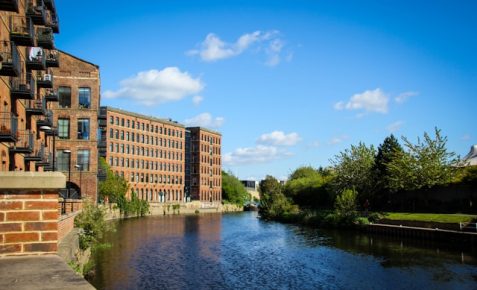How to apply for University
With thousands of courses on offer…at over 150 higher education institutions right across the UK, choosing what to study and where may seem a daunting prospect. There are so many things to consider in order to ensure that your time at university is both successful and fun. But don’t worry, it’s not as complicated as you might expect.
To apply for a university place in the UK, you’ll need to complete your application – including your academic qualifications, course choices, personal statement and a reference – by the required deadline. You’ll only need to apply once rather than approaching each university individually because the UK benefits from a central admissions organisation, the Universities and Colleges Admissions Service (UCAS). It’s an online process so everything is in one place and easily accessible.
Although it’s a clear procedure, you will need to do plenty of research and complete your application carefully to ensure the best chance of securing a place on the course of your choice. This means that it really does pay to get started early, so you have time to consider everything in detail before making any critical decisions. To help you get started, this article takes you through some of the essential steps in applying for university.Contents
How do I apply to university through UCAS?
UCAS handles applications for British universities and its website provides a wealth of information on courses, campuses, higher education finance and student life. Everyone planning to study for an undergraduate degree in the UK – whether they’re a home or international student – must apply through UCAS.
When to apply for university (2021 entry)
For entry to university in 2021, your application must be submitted by:
- 15 October 2020 for students making Oxbridge applications (ie to either University of Oxford or University of Cambridge) or who are planning to study Medicine, Veterinary Science or Dentistry
- 15 January 2021 for the vast majority of other courses.
Note that if you’re applying through your school or college, you’ll need to be ready a bit earlier – check their deadline and stick to this. Also bear in mind that some courses will require an admission test and these may have a different deadline, so check the exact details for the course you choose carefully.
The final deadline for late applications with course choices is 30 June
Provided your application is with UCAS by the required date, you are guaranteed that it will be considered. If you miss the deadline, however, all is not lost – you can still apply for many courses but it’s best to ask the universities first whether they have spaces. The final deadline for late applications with course choices is 30 June. After this, you won’t choose courses but rather go into the ‘clearing’ process, which is what unis use to fill any places they have left.
UCAS application process
The online application process breaks down into two main chunks, which UCAS calls ‘Apply’ and ‘Track’. At each stage, you can log in to check the progress of your application and you’ll receive alerts and e-mails to keep you informed of what you need to do and when.
Apply
When you make your application in the online UCAS system, you won’t need to complete it all at once – you can save your entries and sign back in at any time. You’ll see a handy progress checker on the left-hand side of your screen.
Track
After you’ve applied, the online Track system helps you monitor progress. This stage can be a little frustrating – as it involves several months of waiting – but rest assured that you’ll always been contacted when there is progress you need to know about, such as interviews and decisions (including rejections, so be prepared for some disappointments along the way).
Offers
An offer is when one of your university choices offers you a place on their course. Many offers are conditional on your exam results, so don’t party too hard – you’re going to need those grades!
Replies
These are your responses to any offers you receive, which must be made by the deadline in May. You will usually select two offers – one as your ‘firm’ choice and one as your ‘insurance’ choice. For your firm choice, if you get the grades you need, you’ll receive an unconditional offer. If your firm-choice uni rejects you due to your grades, you will get a place at your insurance-choice uni, provided you’ve met their requirements.
UCAS applications for international and EU students
If you’re a foreign national and considering studying in the UK, you’re not alone! In 2019, nearly 77,000 international students were accepted onto courses here* and most universities have special support services in place for foreign students. British universities have some of the best reputations in the world and studying in the UK is a great way to experience a different culture and make international friends for life!
The good news is that the UCAS process highlights any special information or steps required by international students at each stage of the application process. There are differences in terms of tuition fees and student finance – and remember that this varies according to whether you choose to study in England, Wales, Northern Ireland or Scotland. Many universities offer scholarships or bursaries for international students, so that’s well worth investigating. Another thing to think about when you choose your university is that living costs tend to be higher in London and other major cities than elsewhere in the UK.
Many universities offer scholarships or bursaries for international students, so that’s well worth investigating.
Depending on your choice of uni, you may need to demonstrate proficiency in English. If you require a student visa, you may need to sit a Secure English Language Test (SELT), which is approved by UK Visas and Immigration (UKVI) and can only be taken at an approved SELT centre. Once you have a confirmed start date for your studies, you can organise your student visa – if required – but the earliest you can apply for this is three months before the start of your course.
When choosing your uni, try to find out how many other international students are based there and whether there are any social or cultural groups for students from your specific country or continent. Also, think about what kind of environment you’d feel most comfortable in – British university campuses can vary greatly, with some being steeped in tradition and others providing a more modern environment.
How do I get started?
The first step is to register on the UCAS website. You’ll set a password so that you can log back in at any time. You will need to enter your personal background information – such as contact details, ethnic origin and nationality – as well as your full educational history and details of any full-time or part-time employment.
Criminal convictions
If you have a criminal record, you may be wondering whether you will have to declare this. The answer is that you only need to declare any criminal convictions if you are applying for certain courses – for example, those that involve working with children and vulnerable adults, such as Medicine or Social Work.
What do I need to know about courses and universities?
Before you can make your course and university selections, you’ll need to research the courses that interest you most and find the most suitable places for you to study.
Choosing courses
When you find courses you like, check the entry requirements so that you apply for those you have a good chance of securing a place for. You’re allowed to apply for up to five courses (four if you’re studying Medicine, Veterinary Science or Dentistry), so you can select courses with both higher and lower requirements to give you options if your exam results don’t turn out as expected. There’s no order of preference and your chosen universities won’t see the other places you’ve applied to. If you’re an Oxbridge applicant, you can only apply to one course at either Oxford or Cambridge.
UCAS Tariff points
Some universities use UCAS Tariff points in their entry requirements, so you may need to know how many points your qualifications are worth. The UCAS website has a useful calculator tool, although not all qualifications are included in it – but that doesn’t necessarily mean they aren’t accepted by the universities. If in doubt, check with the university in question. A top tip here is that university admissions departments do not generally count the Tariff points for an AS level qualification if you’ve completed an A level in the same subject.
…University admissions departments do not generally count the Tariff points for an AS level qualification if you’ve completed an A level in the same subject.
How important is my personal statement?
It can be crucial, depending on the demand for your chosen course – that’s why many students get stressed about it. But you don’t need to be worried, just be yourself. Your personal statement is the only part of your application that you can write in your own words and style, so it’s your chance to demonstrate your enthusiasm for the subject you want to study and the personal traits and abilities that will make you a great student.
Your personal statement is the only part of your application that you can write in your own words and style
Take your time to get it right, and improve it over time by asking for suggestions from friends, family and teachers. Remember that the one statement has to cover each course you apply for, so avoid mentioning any courses (if they differ) or universities by name. You can mention your ambitions, experience, skills and achievements – not only academically but also in your sporting, musical, creative or volunteering activities. Keep it concise, though – you have only 4000 characters and 47 lines to make a great impression!
Who can be a reference for university applications?
The final part of your application is including a reference. This is effectively a recommendation, which could be written by a teacher, employer or other professional person. The best referees are those who know you well and can vouch for your work ethic and your ability to collaborate with other students.
Submitting your application
Before you hit the ‘submit’ button, make sure that you take the time to review and check everything in your application very carefully.
Do you pay for UCAS applications?
Yes, there is the little matter of payment for the UCAS service, which is either made directly online or through your school or college. For 2021 entry, the UCAS application fee is £20 if you’re applying for just one course, or £26 for multiple courses and late applications.
What happens when I get my A level results?
If your offers are conditional, A level results day in August will be when you’ll know if you’ve met the target grades for your firm and insurance choices. It’s important to be available on results day, as you may need to speak to UCAS or admissions departments about your application, so try to avoid booking holidays at this time.
In most cases, UCAS sends your results to the universities you’re holding offers with, which will then confirm your place, or reject you. UCAS does this for students across most exam boards but you need to check that your board is included; if not – and this is the case for many international students – you’ll need to send your results to the university yourself.
It’s important to be available on results day, as you may need to speak to UCAS or admissions departments about your application, so try to avoid booking holidays at this time.
If you’re successful, your confirmation letter should appear in the Track tool 5 to 7 days after your place is confirmed – read it carefully, as it may have important instructions for further action you need to take
What if I don’t achieve the grades I need?
Many universities still accept students who narrowly miss their offer conditions but, if not, you still have options. You might be offered an alternative course by the uni (a ‘changed course offer’), which you can accept or decline.
Extra service
If you use all five of your course choices and don’t receive any offers (or you decide to decline the offers you receive), you can apply for additional courses using UCAS Extra. With this free service, you can keep applying – one course at a time – until you get an offer that you’re happy with. The Extra service operates from mid-February until the end of June; if you don’t get an offer during this period, then you can enter into the Clearing process when it opens in July.
Clearing
Clearing is how unis fill any places they still have on their courses. The service enables students to apply for courses with vacancies directly by searching for an available course using the UCAS search tool, and then contacting the university concerned. Students often find this process confusing but it’s quite simple – you can use Clearing if:
- You’re applying after 30 June
- You didn’t receive any offers (or any that you wanted to accept)
- You didn’t manage to meet the conditions of your offers
- You’ve declined your firm place in Track
Keep checking the list of available places, as some courses might be full initially but then have availability later on. Don’t forget to take your time over your choices, as you still need to think about accommodation options and what each campus is like – you may be able to do a virtual tour.
*Source: UCAS



